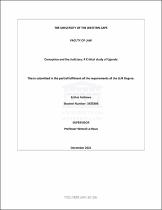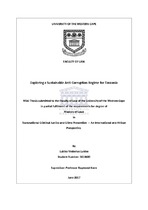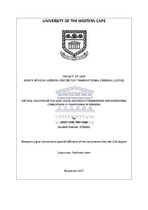Corruption and the judiciary: A critical study of Uganda
| dc.contributor.advisor | Le Roux, Wessel | |
| dc.contributor.author | Asiimwe, Esther | |
| dc.date.accessioned | 2022-03-22T08:03:03Z | |
| dc.date.available | 2022-03-22T08:03:03Z | |
| dc.date.issued | 2021 | |
| dc.identifier.uri | http://hdl.handle.net/11394/8949 | |
| dc.description | Magister Legum - LLM | en_US |
| dc.description.abstract | Corruption, or ‘the abuse of entrusted power for private gain’,1 has been identified by the World Bank as one of the greatest obstacles to economic and social development.2 In Uganda, widespread corruption limits access to and the quality of public services3 and undermines development.4 In the presence of weak monitoring and accountability institutions and sophisticated networks of collaborators, both petty and grand corruption thrive.5 In a 2013 survey conducted in Uganda, 82 percent of the respondents expressed the belief that corruption was entrenched in society.6 In recent years, the perception of the existence of corruption in Uganda has been consistently high, ranging from 25 percent in 2015 and 2016 to 26 percent in 2017 and 2018 (where 0 percent is highly corrupt and 100 percent is very clean). | en_US |
| dc.language.iso | en | en_US |
| dc.publisher | University of Western Cape | en_US |
| dc.subject | Anti-corruption | en_US |
| dc.subject | Judicial corruption | en_US |
| dc.subject | Political corruption | en_US |
| dc.subject | Uganda | en_US |
| dc.subject | Corruption | en_US |
| dc.title | Corruption and the judiciary: A critical study of Uganda | en_US |
| dc.rights.holder | University of Western Cape | en_US |




